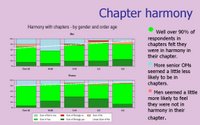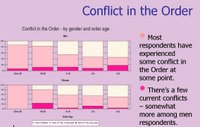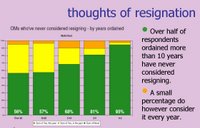The Western Buddhist Order at 40, part VII: harmony, conflict, and thoughts of resignation in the Order.
In the last instalment of this week’s theme, looking at some of the key features and characteristics of the Western Buddhist Order, today looks at the more difficult issues of harmony, conflict, and thoughts of resignation in the Order.
 The three charts display very clearly Order Members’ answers to three key questions for any spiritual community – “Do you feel you are in harmony in your chapter?”, “Do you consider yourself to be in conflict with any other Order Member?”, and “Have you ever considered resigning from the Order?”, the answers being separated out in each case by both gender and order age for ease of comparison.
The three charts display very clearly Order Members’ answers to three key questions for any spiritual community – “Do you feel you are in harmony in your chapter?”, “Do you consider yourself to be in conflict with any other Order Member?”, and “Have you ever considered resigning from the Order?”, the answers being separated out in each case by both gender and order age for ease of comparison.
 It’s much easier, perhaps, to ask questions than to draw conclusions, but the degree of harmony in Order chapters seems striking – also that among those ordained over 10 or even 20 years, over half have never considered resignation. This despite the almost inevitable conflicts most reported experiencing at one time or another.
It’s much easier, perhaps, to ask questions than to draw conclusions, but the degree of harmony in Order chapters seems striking – also that among those ordained over 10 or even 20 years, over half have never considered resignation. This despite the almost inevitable conflicts most reported experiencing at one time or another.

The data comes from a major survey of the WBO conducted last year, which asked many other questions – the practices Order Members do or don't do (and whether or not they found them satisfying), the state of their friendships and relationships, their ethical observances, their wealth and health – and hopes and fears and anxieties for the future – and much more, including even people’s levels of confidence and inspiration to teach the Dharma.
Summaries of all these and more have been posted as a series of slides on a special page at Free Buddhist Audio; anyone interested in the vital statistics of a modern Western Buddhist sangha is invited to browse. Everything there is downloadable in two formats - simple PDFs and as PowerPoint presentations with built-in audio commentaries which give additional information and also offer some reflections on the material.
Comments on the survey material are welcome and can be left on this page. Bringing Buddhism to the West – or into the modern world – is one of the great adventures of our time; and in accordance with the Buddha’s insight into Pratitya Samutpada, or Dependent Co-Arising, we would be wise to understand as deeply as possible those causes and conditions that will give rise to what we seek; and this the 2007 Order Survey attempted to do for the Western Buddhist Order. To quote the words of the Buddha:
This being, that becomes;
from the arising of this, that arises;
this not being, that does not become;
from the ceasing of this, that ceases.
[Majjhima-Nikaya ii.32; Samyutta-Nikaya ii.28; etc.]
Somewhat closer to our own times, Thomas Carlyle, in his work 'Signs of the Times', published in 1829, writes -
"We were wise indeed, could we discern truly the signs of our own time; and by knowledge of its wants and advantages, wisely adjust our own position in it.
"Let us, instead of gazing wildly into the obscure distance, look calmly around us, for a while, on the perplexed scene where we stand.
"Perhaps, on a more serious inspection, something of its perplexity will disappear, something of its distinctive characters and deeper tendencies more clearly reveal themselves; whereby our own relations to it, our own true aims and endeavours in it, may also become clearer."
 The three charts display very clearly Order Members’ answers to three key questions for any spiritual community – “Do you feel you are in harmony in your chapter?”, “Do you consider yourself to be in conflict with any other Order Member?”, and “Have you ever considered resigning from the Order?”, the answers being separated out in each case by both gender and order age for ease of comparison.
The three charts display very clearly Order Members’ answers to three key questions for any spiritual community – “Do you feel you are in harmony in your chapter?”, “Do you consider yourself to be in conflict with any other Order Member?”, and “Have you ever considered resigning from the Order?”, the answers being separated out in each case by both gender and order age for ease of comparison. It’s much easier, perhaps, to ask questions than to draw conclusions, but the degree of harmony in Order chapters seems striking – also that among those ordained over 10 or even 20 years, over half have never considered resignation. This despite the almost inevitable conflicts most reported experiencing at one time or another.
It’s much easier, perhaps, to ask questions than to draw conclusions, but the degree of harmony in Order chapters seems striking – also that among those ordained over 10 or even 20 years, over half have never considered resignation. This despite the almost inevitable conflicts most reported experiencing at one time or another.
The data comes from a major survey of the WBO conducted last year, which asked many other questions – the practices Order Members do or don't do (and whether or not they found them satisfying), the state of their friendships and relationships, their ethical observances, their wealth and health – and hopes and fears and anxieties for the future – and much more, including even people’s levels of confidence and inspiration to teach the Dharma.
Summaries of all these and more have been posted as a series of slides on a special page at Free Buddhist Audio; anyone interested in the vital statistics of a modern Western Buddhist sangha is invited to browse. Everything there is downloadable in two formats - simple PDFs and as PowerPoint presentations with built-in audio commentaries which give additional information and also offer some reflections on the material.
Comments on the survey material are welcome and can be left on this page. Bringing Buddhism to the West – or into the modern world – is one of the great adventures of our time; and in accordance with the Buddha’s insight into Pratitya Samutpada, or Dependent Co-Arising, we would be wise to understand as deeply as possible those causes and conditions that will give rise to what we seek; and this the 2007 Order Survey attempted to do for the Western Buddhist Order. To quote the words of the Buddha:
This being, that becomes;
from the arising of this, that arises;
this not being, that does not become;
from the ceasing of this, that ceases.
[Majjhima-Nikaya ii.32; Samyutta-Nikaya ii.28; etc.]
Somewhat closer to our own times, Thomas Carlyle, in his work 'Signs of the Times', published in 1829, writes -
"We were wise indeed, could we discern truly the signs of our own time; and by knowledge of its wants and advantages, wisely adjust our own position in it.
"Let us, instead of gazing wildly into the obscure distance, look calmly around us, for a while, on the perplexed scene where we stand.
"Perhaps, on a more serious inspection, something of its perplexity will disappear, something of its distinctive characters and deeper tendencies more clearly reveal themselves; whereby our own relations to it, our own true aims and endeavours in it, may also become clearer."

 rss
rss
1 Comments:
I think the WBO's attitude to those who have resigned is an interesting point for reflection. Apparently there used to be a photographic record of the Order: those who had died were still on it, with a stupa, while those who had resigned were erased as though they had never been there!
Post a Comment
<< Home